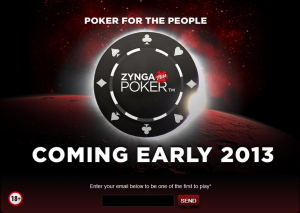Will Lack of Mobile Product Doom Zynga’s Real-Money Poker?
Last week, Zynga – the 800-pound social gaming gorilla that the online poker industry has watched warily since 2010 – announced its Q4 2012 results. To put it mildly, they weren’t very good. Revenue was down 2% from the previous quarter. Bookings, a measure of virtual goods sold, were down 15% year-over-year. Monthly active users and daily active users declined 4% and 6%, respectively. The bottom line was a net loss of more than $48 million.
Those results continued year-long trends for Zynga. The social-gaming pot of gold analysts once thought the company found is turning into pyrite.
Zynga’s mounting losses should hasten its plans for real-money poker and casino games, which CFO Mark Vranesh recently called a “big long-term opportunity” that the company hopes to exploit in the near-future. In addition to filing an application for an online gaming license from Nevada a few months ago, Zynga recently activated teaser websites for its U.K.-only products Zynga Plus Poker and Zynga Plus Casino. Last week Zynga COO David Ko told investors that the company remains on track to launch those products by the end of June.
“We’ll be rolling out these products in multiple phases across a range of platforms in the U.K., namely via web, download and Facebook,” Ko said.
Conspicuously absent from that list of distribution channels is mobile, a channel into which Zynga executives have said they will “hopefully” expand at some point. That puts Zynga behind the curve. Publicly traded gaming companies already have invested heavily in mobile and are reporting anywhere from 5% to 20% of their gross gaming revenues as deriving from mobile, with 20% to 40% of players making a bet from a mobile device.
Not being ready to launch mobile now seems to be a strategic mis-step for Zynga, especially since the company has acknowledged that 25% of its social gaming users, and 21% of its bookings, already come via mobile device.
Mistakes like that won’t make life any easier for Zynga, especially as competitors move in on its prime Zynga Poker turf. On the day of Zynga’s results call, Rational Group beta-launched PokerStars.net on Facebook, a Facebook play-money poker app. PSF essentially is the PokerStars play-money desktop product, re-skinned with a few social-gaming bells and whistles and configured to run inside Facebook. It shares liquidity with PokerStars.net, instantly giving new players access to a very deep player pool and making it a worthy competitor to Zynga Poker.
PSF is a direct challenge to Zynga Poker on the social front and a way for Rational to defend itself against Zynga’s U.K. partnership with bwin.party on the real-money front. Unlike Zynga, Rational Group has proven itself adept at maneuvering within the real-money gaming space (consider its forays into mobile and its pending acquisition of the Atlantic Club in New Jersey) and at maintaining its core business, even as the rest of the industry has softened. If Zynga hopes to compete in real-money gaming, it will need to learn how to convert its social-gaming players to real-money players, something with which Rational Group has more than a decade of experience. And it simply must have a mobile distribution channel, as that is the direction in which the industry appears to be heading.
Zynga’s strategic decisions over the next few months will largely determine whether the company will retain any of its 800 pounds to throw around as it attempts to transition from social games to real-money gambling. Launching in the UK — PokerStars’ home turf — by June will be a key test of those decisions.





















COMMENTS